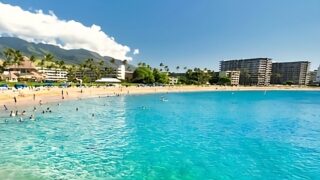Maui’s housing crisis is about to clash head-on with its visitor economy. Thousands of short-term rentals may be on the chopping block—and big changes are already in play.
Bill 9, a long-debated measure from Mayor Richard Bissen, would phase out short-term vacation rentals in apartment-zoned districts across Maui, including areas in West Maui and Kihei. In these neighborhoods, Maui vacation rentals have long blurred the line between residential and resort.
While the mayor initially cited around 7,000 units affected, that estimate has been revised. Recent planning documents suggest only about 2,200 units may ultimately be eligible for conversion to long-term housing.
Now, just days before a key Council committee hearing (details below), new amendments are reshaping the conversation. One proposal would delay enforcement until 2030, and another would exempt timeshares entirely. For supporters, these are necessary refinements. But for critics, they’re a sign of retreat.
What’s happening on June 9.
On Monday, the Maui County Council’s Housing and Land Use Committee will consider Bill 9 in a hearing that is expected to draw strong testimony from every side. Participation in person, online, by phone, or in writing will be accepted.
This is not a final vote, but it marks a decisive step. The committee may advance the bill, amend it, stall it, or send it to the full Council with recommendations.
Several key amendments are now on the table. One would delay enforcement of the vacation rental ban until July 1, 2030. Another would exempt legally established timeshare units. A third would require formal notice from the Department of Finance to affected property owners.
Mayor Richard Bissen introduced the bill more than a year ago. His administration has framed it as part of a larger housing strategy. County officials say the bill targets a root contributor to Maui’s housing shortage: the loss of residential units to short-term rental use in apartment-zoned areas. We anticipate hearing from Bissen on Monday.
One BOH reader who owns a timeshare raised concerns about how things are headed: “We have loved visiting Maui once or twice yearly for over 20 years. Own 4 weeks of timeshare in Kihei… but the overall costs will now bring our stays to a single 2-week visit. We’re likely nearly giving away the other 2 weeks when we go to sell them.”
How we got here on Maui.
The push to regulate short-term rentals on Maui has simmered for over a decade but surged into public view after the August 2023 wildfires destroyed over 2,200 structures. With long-term housing even scarcer now, Bill 9 gained momentum as a way to return more units to resident use quickly.
Based on Maui’s land use rules, the bill targets visitor accommodations in apartment-zoned districts—areas that were never intended for transient use. Many of the affected properties are tied to the so-called Minatoya List, a legal carveout created years ago that effectively grandfathered short-term rentals in certain apartment-zoned buildings. Most of these units were not built for long-term tenants, and in most cases have never been used that way.
Roughly 85% of the properties in question are owned by people with out-of-state mailing addresses. A University of Hawaii Economic Research Organization (UHERO) study analyzing Maui County property tax records found that of the 6,172 units on the Minatoya List, the vast majority are owned by non-residents.
Supporters of the bill say reclaiming this rental market segment is critical to easing pressure on resident housing, especially in communities where entire buildings long ago became de facto hotels.
A new timeline, another divide.
The new proposal to delay the ban until 2030 has drawn immediate reaction from both sides. Supporters of the original bill say the delay undermines the urgency of the housing crisis and has triggered strong backlash from those demanding faster action.
Some critics on social media questioned whether passing a ban with a five-year runway would accomplish anything, calling it a political move to appear active while postponing any real or substantive action.
At the same time, property owners argue that even with the delay, the proposal and the bill have destabilized their investments and threaten retirement income. Many impacted units are small, lack appropriate facilities, and are in aging complexes that offer no viable path to long-term residential use. Some longtime owners have said their properties were never intended for full-time living, with no parking, laundry, or nearby schools or services.
As one reader told us, “These last-minute changes are gutting the bill. It’s politics as usual, and residents are tired of it.”
Economic fears mount as the market shifts.
Maui’s housing market is already reacting strongly. According to the REALTORS® Association of Maui, the median condo sales price fell nearly 25% year-over-year, from $962,500 in April 2024 to $727,000 in April 2025. During that same period, active listings jumped from 536 to 910 units—a nearly 70% surge in inventory.
Some see that as a market correction. Others interpret it as early signs of far deeper instability in the Maui vacation rental industry.
A study by the University of Hawaii Economic Research Organization (UHERO) projects that if the bill passes as originally proposed, Maui could face a $900 million annual decline in visitor spending, 1,900 lost jobs, and a $60 million reduction in property tax revenue by 2029.
Opponents also point to a recent survey indicating that only 8% of short-term rental owners would convert their units to long-term use. Most said they would either sell or leave them vacant. As one commenter said, “Taking away visitor rentals doesn’t equal adding housing. These aren’t affordable units—and they won’t magically become them.”
The timeshare carveout.
One of the most closely watched amendments would explicitly exempt timeshare units from the phase-out. Supporters argue that timeshares operate under different rules than vacation rentals, with fractional ownership structures and fixed usage schedules that make them less disruptive.
But critics question why timeshares should be treated differently. They point out that both involve short-term stays by non-residents and often exist in the same apartment-zoned complexes. The distinction, they argue, is arbitrary, and it has sparked growing anger among those who see it as another loophole for well-connected property classes.
The current version of Bill 9 introduced by Council Chair Tasha Kama includes the exemption in clear terms. Earlier drafts, including the mayor’s original proposal, did not. County officials have since suggested that clarifying language could be added, but there is no consensus on how timeshares should be handled.
Legal limbo ahead.
Even if the committee advances the bill on Monday, final passage could take months, and lawsuits are all but guaranteed no matter what happens next.
Property owners have relied on long-standing county approvals, business licenses, and tax classifications to operate legally. They argue that if the county reverses course, it could amount to a regulatory taking under state or federal law—something they say they will simply not allow.
Multiple legal challenges are underway related to Maui’s handling of short-term rental permits and zoning enforcement. Bill 9 would almost certainly add more.
Will this change Maui for visitors or residents?
Supporters say yes—eventually. If even a fraction of the phased-out units reenter the long-term housing market, it could help meaningfully ease the shortage. Others argue it will push rentals to other islands, other parts of Maui, or unregulated channels.
There’s also a cultural dimension. For many residents, the bill represents a chance to reclaim neighborhoods overtaken by transient visitors.
But there’s a risk, too. As one reader warned, “If you make it too hard to visit Maui affordably, people will simply stop trying.”
How you can participate.
The Housing and Land Use Committee meets on Monday at 10:00 a.m. The session will be broadcast on Akaku Channel 53 and streamed online via Microsoft Teams.
Testimony will be accepted in several formats. Participants may testify in person at the Council Chambers, by phone at 1-808-977-4067 (code: 461 899 61#), or online via Microsoft Teams by visiting mauicounty.us/agendas and clicking the meeting link listed for June 9.
Written testimony can also be submitted by email to [email protected] or through the eComment system on the same site.
What do you think?
Should Maui delay the ban until 2030? Should timeshares be exempt? Have you stayed in one of the condos that could be affected, or do you own one?
Your voice matters, especially now. Join the conversation below or submit testimony to Maui County before Monday’s hearing.
Get Breaking Hawaii Travel News







I’m not a super fan of tourists, you can pick them out easily, pasty white people driving jeep or mustang convertible wearing their baseball hat. But we need them. I make Deliverys and a lot of our business dollars comes from them. They should let people keep there short term rentals. It’s good for our economy and as previously mentioned in the article, the taxes and fees that come in is important. The state needs to find some where to build affordable housing for locals.
There will be a loss of many jobs , but mostly ones with out medical or pensions. People that work on call, as needed.
New jobs will be created at the hotels and also at the legal vacation rentals that will have their occupancy go up. ✅🌺
Tge tge Lahaina Harbor is closed from fire sane. That affects 600 jobs. No one is pressing the harbor to reopen
Terribly sad to read this. So sorry. Wonder if there is anything that could be done.
Has anyone got suggestions?
Why do Hawaii residents consistently vote these unqualified state congress people into office? And Josh Green, MD? Who do they really care about? People who will vote for them, and a hotel association that funds their campaigns. Why do they persecute out of state condo owners and tourists?
There are better ways to handle this. Cut the liberal NIMBY red tape that is even restricting new home and apartment construction in Lahina – tax those who have no say, and restrict those that are trying to solve the housing crisis.
Why is the press not digging into this? Well, who controls them.
I am curious if you have looked into the project in Kihei that is slated for public hearing on 9/9. Looks to be a hotel zoned condo complex which would be counter to the initiative of reducing STRs and creating more residential options in Maui and particularly south and west Maui. Would love to know your thoughts and if you have gathered more details on the project.
I’ll throw my voice into the uncaring void of Maui politics. I’ve been to Tahiti a few times, and have always been impressed by their “pension” (i.e. guesthouse) system. Maybe something similar would work on Maui.
Yes, I come from Ireland.
Guest houses were normal, everyday things in my home town. The Irish Tourist Board decided to supervise them in the years after I left Ireland which was a good thing to regulate their standards. When I used to vacation in European countries we enjoyed staying in “pension” homes. Bed and breakfast is the other term for these homes. The local people hosting were so knowledgeable about the areas surrounding their locations that it made the trip great. They would tell us where to travel to sightsee something we had read about in tourist brochures etc. I think this would work really well on Maui, giving tourists info from locals that is so valuable when one is in a different country/location. Also it would mean friendliness so avoiding any resentment between locals and tourists.
I wonder if Maui residents would care for this.
Owners probably would but the politicians have made it ok for residents to openly discourage visitors. We own & rent a condo in Kihei. We visit each year and keep a document as was suggested we provide to our guests. It also saves them a lot of vacation time.
There are lots of excellent rentals on Maui right now that are available at very attractive prices so encourage potential visitors to take advantage of it. Mahalo.
Thank you. I have been flying to Maui, Kihei, for the Winter months each year. With the controversy about STRs I am hesitant to make a reservation for a 2025-2026 trip. Perhaps I will search for a rental after reading your message. Thank you.
Eva, Vancouver, Canada